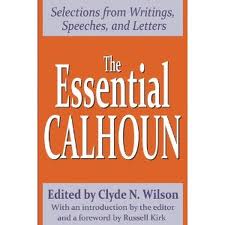
- Details
- Category: Recommended Reading Recommended Reading
- Published: 03 September 2012 03 September 2012
- Hits: 4714 4714

A number of years ago I had the pleasure of meeting Clyde Wilson. Professor Wilson has spent many years editing The Papers of John C. Calhoun. He taught history for many years at the University of South Carolina. I was wanting to look up something on Calhoun the other day, and turned to Wilson's edited volume, The Essential Calhoun: Selections from Writings, Speeches, and Letters (Transaction, 2000). I noticed (and had forgotten) that Russell Kirk had written the foreword to this one volume collection of Calhoun's writings (by the way, the introduction by Wilson himself is an excellent way to get acquainted with Calhoun). Calhoun's own understanding of consitutional government, and of the way in which a constitutional government can slide into tyranny is arguably unmatched. Calhoun wrote in 1842:
"As the Government approaches nearer and nearer to the one absolute and single power, the will of the greater number, its action will become more and more disturbed and irregular; faction, corruption, and anarchy, will more and more abound; patriotism will daily decay, and affection and reverence for the Government grow weaker and weaker, until the final shock accours, when the system will rush to ruin; and the sword take the place of the law and the Constitution."Calhoun was certainly correct in that government tends to centralize and become tyrannical. We might simply challenge him by noting in our own day there can be a complete departure from constitutional government right along side a certain type of patriotism. In short, Calhoun may not have seen as clearly the modern tendency to deify the state, and for many citizens (subjects?) to blithely worship that government which has become their overseer.
Kirk's own summary of what has happened since Calhoun's time is spot on. Kirk writes:
". . . the American Republic has ceased to be a nation of states. Centralization of power hs reduced the states to a condition little better than that of provinces in an an empire" (p. xii).
Kirk was fond of a line from Chesterton, which he quotes in the Foreword:
"The wise men know what wicked things
Are written on the sky,
They trim sad lamps, they touch sad strings,
Hearing the heavy purple wings,
Where the forgotten seraphy kings
Still plot how God shall die."
Kirk thought Calhoun was one of these "wise men," and that "Calhoun was the best exponent of the idea of political order that underlies both the written constitution and the unwritten constitution of the Amercan Republic." I suspect Kirk was right.